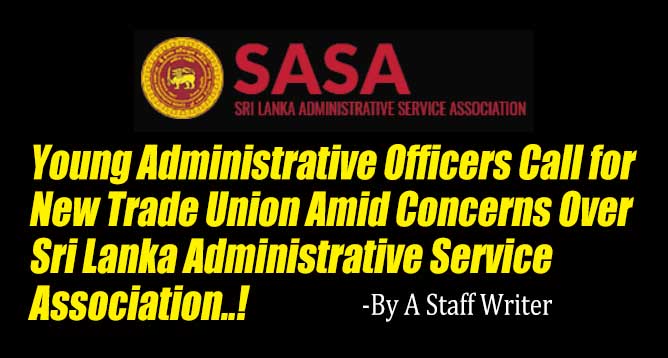-By A Staff Writer

(Lanka-e-News -29.June.2024, 10.30 PM) A growing discontent among young administrative officers in Sri Lanka has led to calls for the formation of a new trade union, as frustrations mount over the perceived inefficacy and self-serving nature of the Sri Lanka Administrative Service Association (SASA).
Young officers accuse the SASA of obstructing much-needed modernization of the public service in Sri Lanka. Allegations have surfaced that senior committee members of SASA prioritize maintaining the status quo and their personal gains over meaningful reforms. These committee members, critics claim, have been making undisclosed deals with the government without consulting the general membership, undermining transparency and accountability within the association.
President of SASA, Mahesh Gammanpila, has come under fire for allegedly compromising members' welfare by suspending industrial actions in favor of personal negotiations with the government. This has led to a growing sentiment that SASA is no longer fit for purpose, particularly among younger administrative officers who are eager for change.
The broader public service in Sri Lanka has long been criticized for being riddled with corruption and inefficiency. Administrative officers are often accused of failing to maintain discipline and provide timely services to taxpayers. Many citizens feel compelled to pay bribes to expedite processes, exacerbating public distrust in the system.
The International Monetary Fund (IMF) has also raised concerns about the state of Sri Lanka’s public service. The lack of digitalization and reliance on outdated documentation methods have been highlighted as major contributors to delays and inefficiencies in service delivery.
Young administrative officers argue that SASA has become a barrier to the necessary modernization efforts needed to overhaul the public service. They believe that the association’s current leadership is not committed to addressing the systemic issues that plague the administrative framework.
In response, there is a strong push among these young professionals to establish an alternative union that will champion modernization and reform. This new entity aims to foster a culture of transparency, accountability, and efficiency, advocating for digitalization and streamlined processes to improve service delivery to the public.
The proposed new trade union seeks to bring fresh perspectives and energy into the administrative sector. By leveraging technology and advocating for robust anti-corruption measures, young administrative officers hope to transform the public service into a more efficient, trustworthy, and taxpayer-friendly institution.
Supporters of this movement emphasize that the success of such an initiative will require a collective effort from all stakeholders, including the government, international partners, and the general public. The goal is to create a public service that truly serves the interests of the people, ensuring timely and corruption-free interactions with administrative offices.
As discontent grows among young administrative officers, the call for a new trade union reflects a broader desire for change within Sri Lanka’s public service. The success of this movement could mark a significant step towards creating a modern, efficient, and transparent administrative framework that meets the needs of the 21st century. For Sri Lanka, this could be a pivotal moment in restoring public trust and improving the quality of services provided to its citizens.
---------------------------
by (2024-06-29 17:34:34)
Leave a Reply